Trustees Acted Responsibly on Monte Nido
- Details
- Written by: Joanne Wallenstein
- Hits: 6205
 The following is an opinion piece from Scarsdale10583: There's no easy answer to the dilemma posed by the application of Monte Nido to purchase a home in Scarsdale's most exclusive neighborhood to open a facility for teenagers with eating disorders. On the one hand, the company is proposing to operate a commercial enterprise in an area governed by strict zoning codes that bar businesses from residential areas. Yet on the other hand, Monte Nido is serving teens with a life threatening condition and they have NYS law on their side. New York State's Padavan Law dictates that group home operators can break local code to operate "family-style" treatment homes in areas zoned for single-family houses.
The following is an opinion piece from Scarsdale10583: There's no easy answer to the dilemma posed by the application of Monte Nido to purchase a home in Scarsdale's most exclusive neighborhood to open a facility for teenagers with eating disorders. On the one hand, the company is proposing to operate a commercial enterprise in an area governed by strict zoning codes that bar businesses from residential areas. Yet on the other hand, Monte Nido is serving teens with a life threatening condition and they have NYS law on their side. New York State's Padavan Law dictates that group home operators can break local code to operate "family-style" treatment homes in areas zoned for single-family houses.
Parties from both sides are passionate about their convictions and have called on the Scarsdale Board of Trustees to endorse their respective sides. In recent weeks, residents have questioned the role of the Mayor and the Village Board in the decision making process. According to New York State law, the duties of Village trustees include, "the protection of its property, the safety, health, comfort, and general welfare of its inhabitants, the protection of their property, the preservation of peace and good order, the suppression of vice, the benefit of trade, and the preservation and protection of public works."
Given their responsibilities, should the Board act to safeguard residents' property rights and use their power to block the treatment home, or do they have an ethical responsibility to welcome the facility, which will treat adolescents who may be very similar to young girls in Scarsdale? In short, is it the Board's responsibility to defend the folks that have already made a significant investment in the Village or to open doors for a company to use the Scarsdale name to draw select clients to their facility? As with most controversies, the issue is not black and white. I would contend that it is the Board's job is to weigh the rights of residents vs. the needs of Monte Nido and their patients.
When the application was filed, the Trustees cast a wide net to be sure that everyone concerned could be heard. They provided residents with a forum to find out the facts and air their views at an information session with the leadership of Monte Nido at the Scarsdale Library on November 15. This session was followed by a meeting at Village Hall on November 24. When there was not enough time for everyone to speak at the forum, Mayor Mark made an unprecedented decision to delay the regular session of the Village Board to give everyone a chance to come to the microphone.
It should be noted that the issue drew one of the largest crowd I've ever seen at Village Hall as well as petitions, emails and letters. And though some advocated for Monte Nido, the overwhelming sentiment among those who spoke was against allowing the facility to operate in the Village. Neighbors of the home feared diminution of their property values, added traffic, a strain on village services and the presence of a commercial enterprise in a residential area with it's own historic covenant. Though it was acknowledged that the Padavan Law trumps local zoning code and has rarely if ever been successfully challenged, residents lobbied the Mayor and Trustees to object and make an attempt to discourage the facility in Murray Hill. To many, the use of the Padavan Law to open a for-profit treatment center owned by a private equity firm appeared to twist the intention of the law.
Following much deliberation the Board of Trustees voted unanimously to file an objection. In a statement explaining the decision, Mayor Mark noted that the facility would likely pose no risk to the neighborhood but said, "The Heathcote area through which Morris Lane runs has been an exclusively a residential area throughout its more than 100-year existence as a developed part of the Village. Neither Monte Nido, nor any other facility similar to the one proposed, could locate in that part of the Village absent the Padavan Law."
Though it's doubtful that the Commissioner of Health will sustain the Trustee's objection to the home, in their decision to oppose Monte Nido, it appears that the trustees listened to a large group of constituents and weighed their concerns versus the desires of an outside group to challenge Village code.
To me the issue is similar to the discussion about Fair and Affordable Housing. When the Anti-Discrimination Center won a lawsuit against Westchester County in 2009, the county was charged with building 750 units of affordable housing in areas that lacked diversity and where "restrictive zoning code" blocked affordable housing. The Federal Monitor called on the County Executive to " take communities to court to stop them from blocking integration through restrictive zoning." In Scarsdale, this could mean that a 3-acre plot on Heathcote Road might be the site of a 10 or 20 unit building of affordable units.
How did the Village react to this challenge? Rather than invite the construction of multi unit housing in areas zoned for single-family homes, the trustees formulated a new comprehensive village plan that allowed for multi-unit buildings in Scarsdale's commercial districts. In addition, they adopted model code that required the inclusion of affordable house into new developments in the Village. In this way, they complied with the HUD settlement while safeguarding property rights.
But Monte Nido is a tougher nut to crack. Two weeks after the Trustees sent their objection to the Commissioner of Health, four residents appeared at the December 9 meeting of the Board of Trustees and harshly criticized their decision. They questioned the Trustees values and called the decision "selfish" and "intolerant." Jeff Blatt said, "you are elected to use your judgment," and Josh Frankel called this "Scarsdale's sorriest moment." Dr. Andrea Grant said, "The only reason left for continued opposition is prejudice and Jonathan Bradlow said it was a "vote of support for the stigmatization of mental illness," and asked the trustees to withdraw their objection.
Though these residents have every right to disagree, their comments would have been more helpful before the die was cast. They had ample opportunity to make their views known when the Trustees were assessing the views of their constituents. Furthermore, the latecomers called on the trustees to exercise moral leadership. They believed that the trustees' ethical responsibility should supersede their charge to protect the property of their constituents, which is one of the mandates of serving as a trustee under NYS law. The law is silent on the moral or ethical responsibilities of Village trustees.
On balance, I believe that the Board did carefully weigh all the factors. They received a loud message from those who live nearby the proposed facility and balanced their objections against ethical concerns and the realities of the Padavan Law. By filing the objection to the facility they responded to homeowners who have made a significant investment in Scarsdale and bear a hefty tax burden. At the same time, the Trustees surely realize that their move was more form than substance as the odds are slim that Monte Nido will be turned away.
Critics might not agree with the Board's decision to object to Monte Nido, but they should acknowledge that the Board listened, deliberated and voted to do what they determined was best for Scarsdale. In other words, they did their job.
Scarsdale received this note from the Village Attorney on December 14: In response to the Village's Notice of Objection to Monte Nido's Padavan Notice, the Office of Mental Health informed the Village that the requested hearing will be scheduled sometime after the upcoming holidays.
Note from the Village: CONSERVATION ADVISORY COUNCIL VACANCIES ANNOUNCED:
The Personnel Committee of the Village Board of Trustees has announced two (2) vacancies on the Conservation Advisory Council (CAC).
The Conservation Advisory Council's (CAC) mission is to advise the Board of Trustees on issues affecting the Village's environment and the maintenance of its natural character. In recent years the CAC has undertaken a review of the Village's tree ordinance, explored leaf collection alternatives and it is now reviewing municipal storm water strategies and policies.
The CAC's approach is to carefully research and discuss policy alternatives and to craft recommendations that attempt to respect the legitimate concerns of all stakeholders. The CAC meets once monthly for lively and often creative discussion. To insure independence of thought, it relies on diversity and is an ideal entry into Village government. If you care about your local environment and beyond, joining the CAC is one of the best ways you can help.
The CAC meets once a month to research and formulate Village policy regarding the environment, trees, landscaping, leaves and other issues. Are you interested in preserving Scarsdale's natural character? Want to positively affect the future? Apply to join the CAC.
All interested residents may apply online at the Village website, www.scarsdale.com, under "Village News, Volunteers Needed for Boards and Councils" or submit their resume directly to the attention of the Personnel Committee Chair, Trustee Carl Finger, Scarsdale Village Hall, 1001 Post Road, Scarsdale, N.Y. 10583. For further information contact the Village Clerk's office at 914-722-1175.
Are We Ready for the Library of the Future?
- Details
- Written by: Joanne Wallenstein
- Hits: 12854
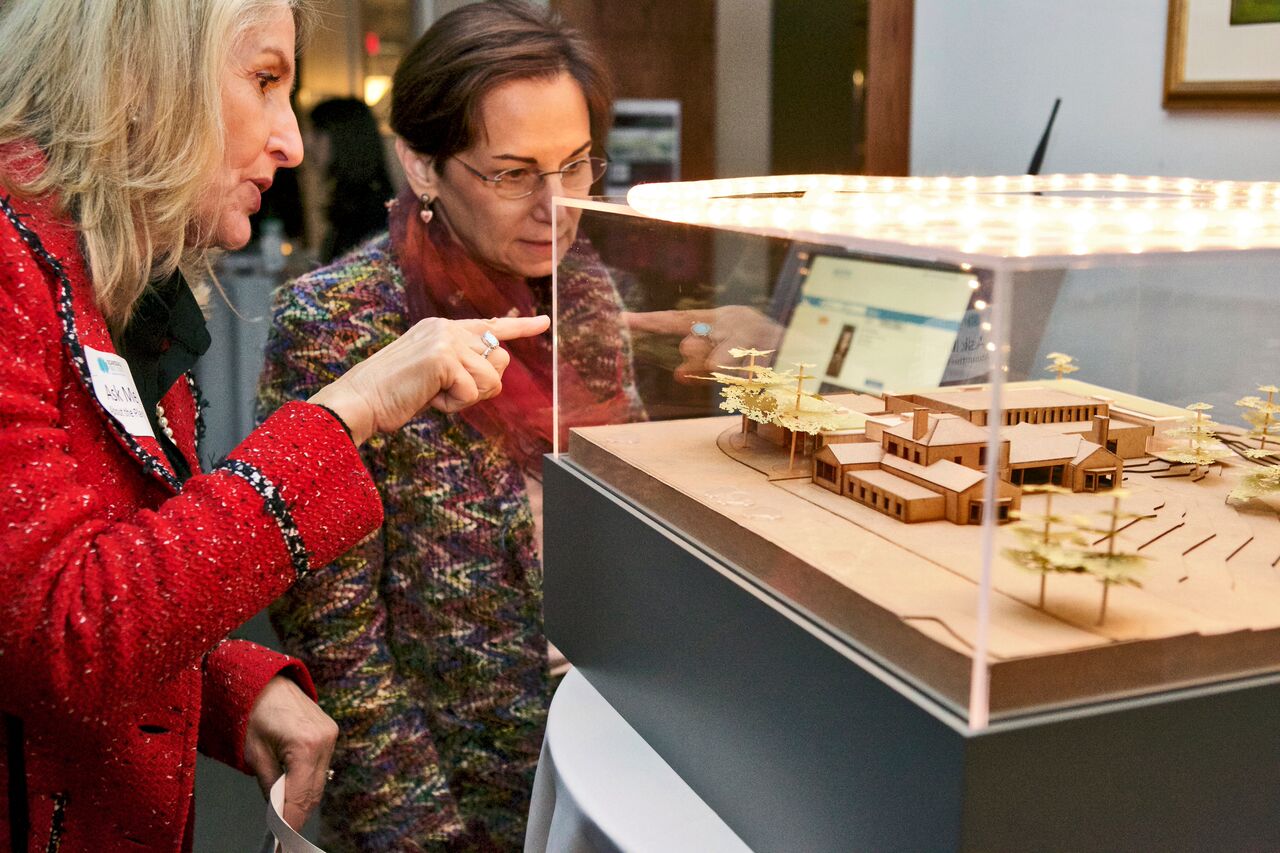 Ambitious plans for a major renovation to the Scarsdale Library were unveiled at an elegant party called Books, Bits and Blueprints on Thursday night December 3rd. The library never looked better – furniture in the main reading room was cleared to allow for a bar, a band and a spread of hors d'oeuvres, and a waterfall of sparkling lights was hung from the mezzanine, making the space look more like a nightclub than a study space.
Ambitious plans for a major renovation to the Scarsdale Library were unveiled at an elegant party called Books, Bits and Blueprints on Thursday night December 3rd. The library never looked better – furniture in the main reading room was cleared to allow for a bar, a band and a spread of hors d'oeuvres, and a waterfall of sparkling lights was hung from the mezzanine, making the space look more like a nightclub than a study space.
On hand were hundreds of supporters, young and old including library employees, Village Trustees, school board members, bibliophiles, parents and community members. Renderings for the proposed new space were displayed, giving everyone a chance to preview what the library board and architects have envisioned for the future.
According to Library Director Elizabeth Bermel, the  current library is heavily used and inadequately configured to meet the demands of the community. Though Scarsdale ranks 16th in population in the county, our library ranks fourth in usage. There are 300,000 annual visits and the library is "hopping" at all hours of the day, seven days a week. In order to offer a space where residents can work, meet, engage and utilize emerging technology the building needs to be transformed.
current library is heavily used and inadequately configured to meet the demands of the community. Though Scarsdale ranks 16th in population in the county, our library ranks fourth in usage. There are 300,000 annual visits and the library is "hopping" at all hours of the day, seven days a week. In order to offer a space where residents can work, meet, engage and utilize emerging technology the building needs to be transformed.
The plans, which can be viewed here, involve renovations to all the existing interior spaces and expansions around the perimeter to allow the library to be integrated with its park-like setting. Wiring and equipment for state-of-the art technology will be installed to allow users to collaborate, do research and access new media.
 The entry will become a glass lobby and café where users can chat, relax and enjoy a snack or light meal. The new configuration will include several flexible meeting rooms and small group study rooms. The children's wing and children's program room will be updated and there will be a separate teen room as well. The main reading rooms will be encased in glass and surrounded by a reading gallery and deck that looks out on library pond. The current reference room will be a quiet reading room with comfortable seating. Those who work from the library will have access to a technology suite with a printer, copier, laminator and other equipment to accommodate hands-on projects.
The entry will become a glass lobby and café where users can chat, relax and enjoy a snack or light meal. The new configuration will include several flexible meeting rooms and small group study rooms. The children's wing and children's program room will be updated and there will be a separate teen room as well. The main reading rooms will be encased in glass and surrounded by a reading gallery and deck that looks out on library pond. The current reference room will be a quiet reading room with comfortable seating. Those who work from the library will have access to a technology suite with a printer, copier, laminator and other equipment to accommodate hands-on projects.
The basement will be renovated to serve as a staff work and lunch area and there will be a room with historical archives that can be accessed by the public. The administrative offices on the second floor will be also be redone.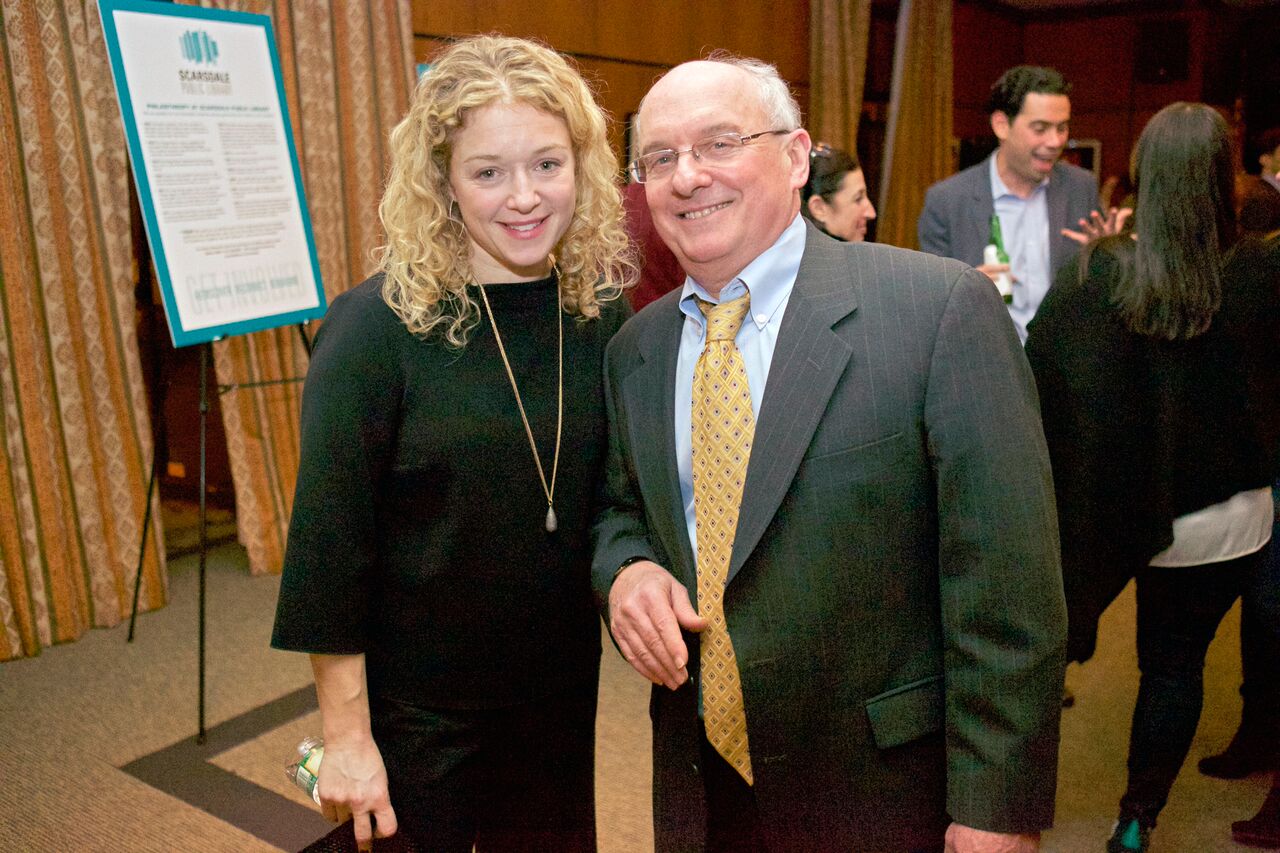
In addition to making the library more user-friendly, the renovation will address some structural issues:
The roof will be replaced
An elevator will be added for multi-level access from the basement to the second floor.
New ADA compliant restrooms will be built that can accommodate wheelchairs and families
There will be an updated kitchen
New windows will be installed
A powerful generator will supply heat, electricity and internet access to the building if the area loses service.
The price tag for the project is estimated at approximately $18.5 million with an additional million needed to set up a temporary library at Supply Field for the 18 months it would take to build the new library. The Library Campaign Committee is seeking to raise $7.5 million in private monies to fund a portion of the project, with the balance coming from Scarsdale Village, who will post a bond to finance their share. There is a precedent for a public private partnership from the construction of the original library.
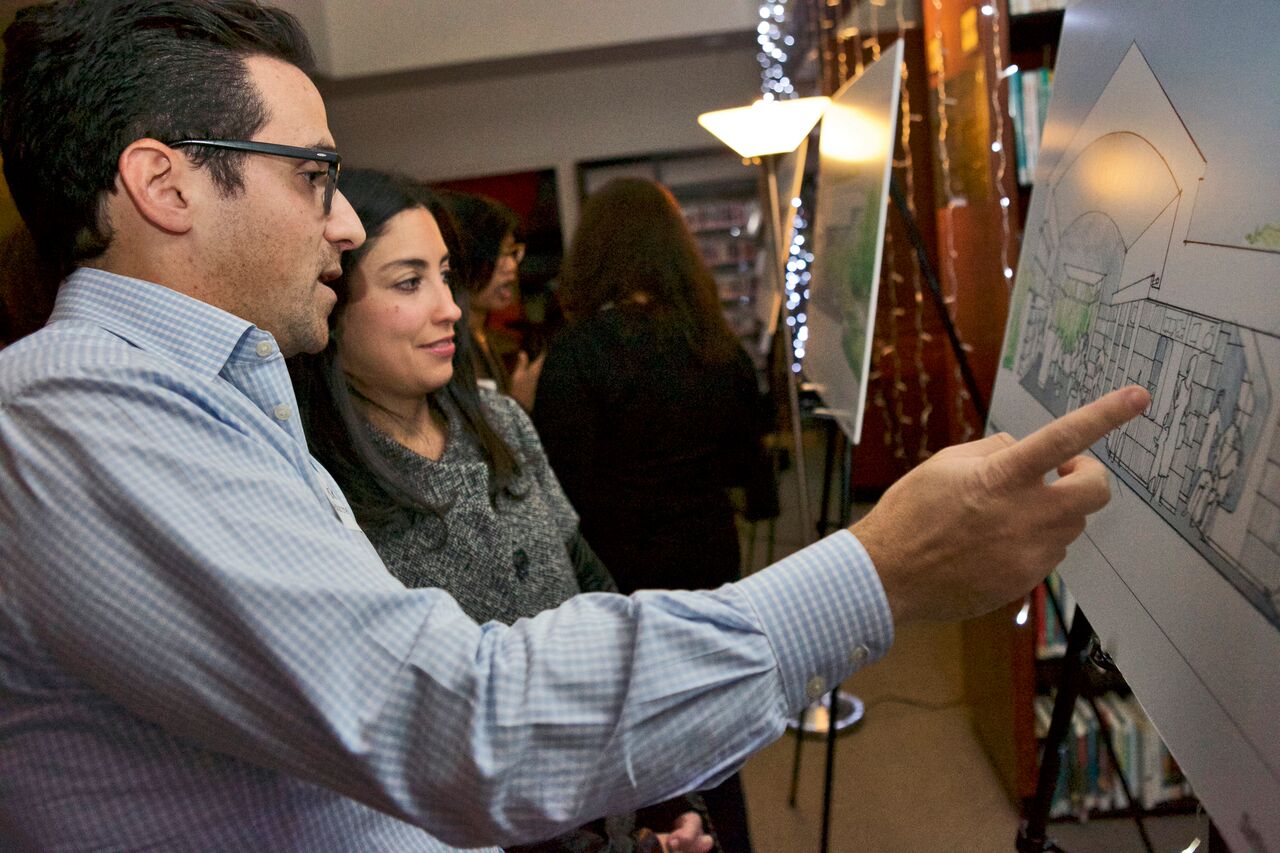 At a meeting at the library with leaders of Scarsdale's neighborhood associations, (SNAP) on Monday December 7, Library Board President Terri Simon and Mayor Jon Mark revealed more about how the project might be financed.
At a meeting at the library with leaders of Scarsdale's neighborhood associations, (SNAP) on Monday December 7, Library Board President Terri Simon and Mayor Jon Mark revealed more about how the project might be financed.
Simon said the Campaign Committee is now soliciting major gifts to kick off the campaign. They hope to soon raise enough to pay the architects to do complete design and construction drawings that can be sent out for bids.
Mayor Mark said he was enthusiastic about the plans and that the other Village Trustees have expressed varying degrees of support for the project. He called the public portion of the financing, $12 million, "a big nut" and offered some back-of-the-envelope estimates of what the financing would mean to taxpayers. He estimated that if the Village posted a bond for $12 million at an interest rate of 2.75%, annual payments on the debt would be $985,000 a year. If this amount were divided by approximately 5,900 households, on average each household would pay $167 per year for 15 years.
Mark said that this expense needs to be balanced  against other demands on the Village budget including funding for major sewer line renovations and road repairs. He asked the community to let the trustees know their views by sending an email to clerk@scarsdale.com or attending a meeting of the Board of Trustees and speaking at the public comments session.
against other demands on the Village budget including funding for major sewer line renovations and road repairs. He asked the community to let the trustees know their views by sending an email to clerk@scarsdale.com or attending a meeting of the Board of Trustees and speaking at the public comments session.
At the SNAP meeting, audience members posed questions, including:
What will happen if the Library Campaign Committee is not able to raise the full $7.5 million? Mark said that either the Village would fund the balance or ask the Library Board to scale back their plans.
Have the architects supplied an estimate on constructing a new library, rather than renovating the existing structure? Simon said that community sentiment supported saving the library and conserving the stone portions of the exterior so this option was not explored.
Is it necessary to open the temporary library during the construction? Could Scarsdalians simply use neighboring libraries? Bermel said that the state mandates that the Village maintain a library or pay neighboring libraries hefty fees to service Scarsdale residents. Simon added that the renovations to the Supply Field building would be permanent and would improve the facility for the future.
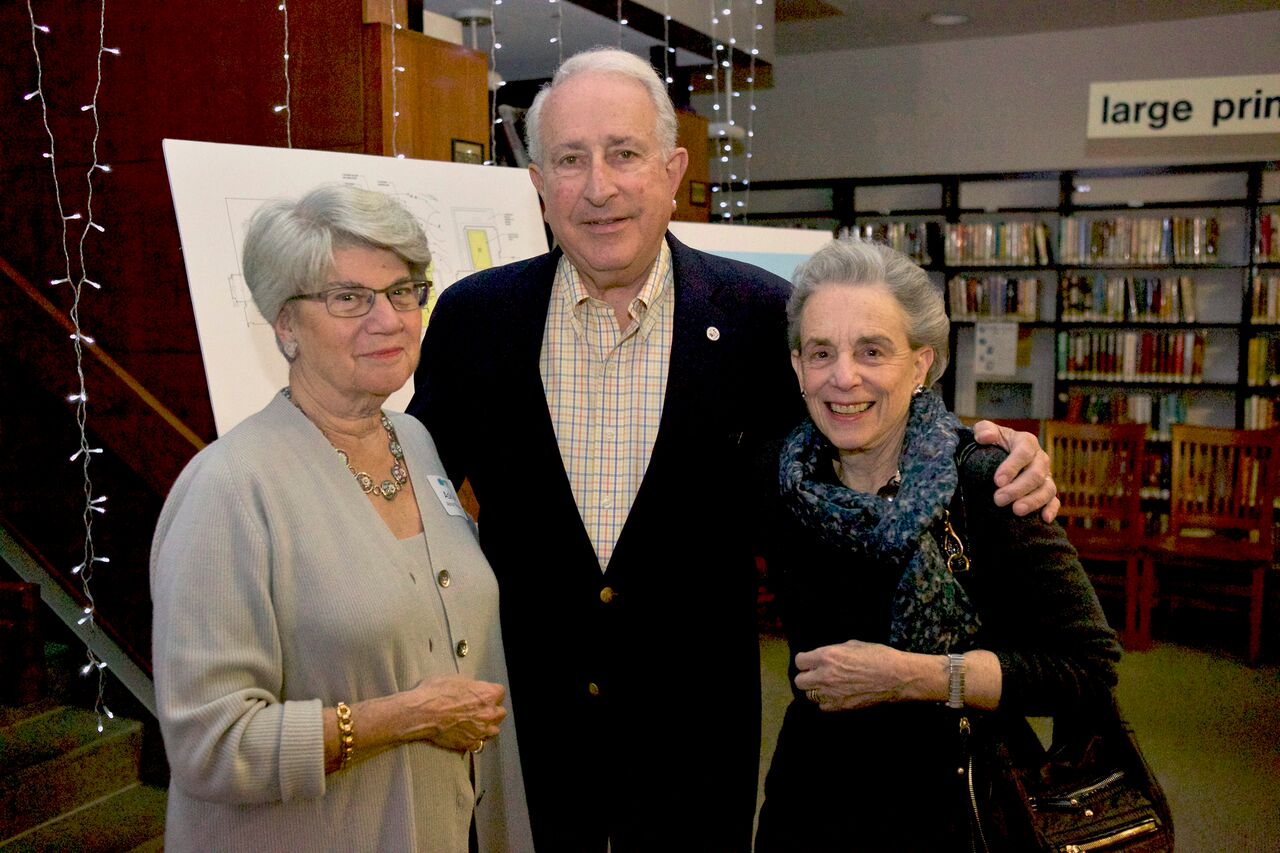 Have the architects provided an estimate for the structural improvements without the renovation – i.e. a bid to repair the roof, build ADA compliant restrooms, repair the windows? Simon said that since the existing structure can't accommodate some of these changes all the pieces fit together for a complete renovation.
Have the architects provided an estimate for the structural improvements without the renovation – i.e. a bid to repair the roof, build ADA compliant restrooms, repair the windows? Simon said that since the existing structure can't accommodate some of these changes all the pieces fit together for a complete renovation.
What do you think? Express your views in the comments section below.
All photos by Paula Whittlin
Scarsdale Trustees Vote to Object to an Application for a Residential Treatment Center in Murray Hill
- Details
- Written by: Joanne Wallenstein
- Hits: 16857
 A hearing about an application to open a residential treatment facility in a residential neighborhood on Morris Lane in Murray Hill drew a record crowd to Village Hall for a pre-Thanksgiving meeting on Tuesday night November 24. Prior to the meeting, the Village had received 41 communications in opposition to the application and another seven petitions. The room was filled with both advocates and objectors, including representatives from Monte Nido -- the corporation who runs similar residential treatment centers in New York, California, Oregon and Massachusetts, attorneys for both sides, local residents who fear the impact of the center, others who believe this area needs the facility, the leaders of the Scarsdale Advisory Council on People with Disabilities and experts on anorexia, traffic and more.
A hearing about an application to open a residential treatment facility in a residential neighborhood on Morris Lane in Murray Hill drew a record crowd to Village Hall for a pre-Thanksgiving meeting on Tuesday night November 24. Prior to the meeting, the Village had received 41 communications in opposition to the application and another seven petitions. The room was filled with both advocates and objectors, including representatives from Monte Nido -- the corporation who runs similar residential treatment centers in New York, California, Oregon and Massachusetts, attorneys for both sides, local residents who fear the impact of the center, others who believe this area needs the facility, the leaders of the Scarsdale Advisory Council on People with Disabilities and experts on anorexia, traffic and more.
Since the property is accessed on Morris Lane in Scarsdale but borders on Dorchester Road, it affects residents of both Scarsdale and New Rochelle. Furthermore, since it is located on a flag lot, the driveway crosses several neighboring properties and a sewer line easement was formerly granted to run a pipe through a property on Heathcote Road.
For those who are puzzled as to why a commercial facility would be permitted to operate in an area zoned for residential use, the answer lies in the Padavan Act which was enacted in 1978. This legislation dictates that group homes serving those with mental and physical health needs be treated as single-family homes and that local zoning codes cannot bar their establishment in residential areas.
According to attorneys, the case law shows that municipalities that challenge the law have had very little success. Scarsdale needs to act within 40 days of the October 27th application and approve the application, suggest an alternative location in the village, or object if there is clear and convincing evidence that it would cause an over-concentration of facilities or an undue burden on the community.
Mayor Jon Mark gave representatives from Monte Nido and the lawyers from both sides the opportunity to speak first, which used up most of the meeting time. The trustees than went briefly into executive session before they opened the regular bi-weekly meeting of the Board of Trustees and amended their agenda to give more time to those who wished to speak on the issue.
Following public comments, there was a pause for another deliberation among the trustees and the Village Attorney. When Mayor Mark returned to Rutherford Hall and delivered their decision, it brought cheers from the crowd. He announced that after hearing the residents and studying the documents they received, the trustees have decided to file an objection to the application with the Department of Health and Human Services "on the grounds of over concentration, and such other grounds as may exist, if any." He anticipates that the Commissioner of Health will schedule a hearing within 15 days, but asked Monte Nido to reconsider their plans, saying, "It would seem contrary to pursue a plan that elicits this level of opposition." Though the Village does have the right to suggest another location for the facility within Scarsdale, Mark said the trustees would decline to do so and asked Monte Nido to look for other options in southern Westchester to locate the facility. (Mayor Mark's full comments are shown below.)
Representatives from both sides presented persuasive arguments. Attorney David Steinmetz was retained by Monte Nido to support their application and noted that he had declined business from opponents of the home who had also asked him to represent them.
Seeking to head off objections about traffic, he argued that Monte Nido's home in Irvington houses 14 adults who have their own cars and often come and go from the property. In Scarsdale, the adolescent girls would not have cars of their own. He sought to warn trustees about objecting to the facility, saying similar homes had been opened in Southampton, Chappaqua and Port Chester. Claiming, "there will not be more than 6-8 people on site at a time," he said, "I am disturbed at the vituperative comments."
Vicki Kroviak, the Monte Nido CEO who lives in Irvington told the group that  she suffered from an eating disorder as a teen and now has a child with special needs. She said Monte Nido chose Scarsdale because they were looking for a home in "lower Westchester that met our specific requirements." She said, we "receive a large number of calls from people who want us to take their adolescent daughters and we are not licensed to do that here." She said, "We have been looking for almost a year," and this home is large enough, has a large lot, beautiful rooms, a swimming pool, a six-car garage, wide hallways, an elevator and a "high degree of accessibility for those with physical disabilities."
she suffered from an eating disorder as a teen and now has a child with special needs. She said Monte Nido chose Scarsdale because they were looking for a home in "lower Westchester that met our specific requirements." She said, we "receive a large number of calls from people who want us to take their adolescent daughters and we are not licensed to do that here." She said, "We have been looking for almost a year," and this home is large enough, has a large lot, beautiful rooms, a swimming pool, a six-car garage, wide hallways, an elevator and a "high degree of accessibility for those with physical disabilities."
Attorney Joshua Grauer of Cuddy and Feder represented four residents who live near the proposed facility. He discussed the "Unique natures of the lot," and limited access to it caused by a driveway which he said was 200 feet long and only 12 feet wide and poses a problem for cars, trucks and ambulances that might need to access the property. He said, "We need a full blown parking plan and site study in conjunction with the proposal. We are asking the village to review all of the facts and obtain all the details before you reach a decision. Does this location create an over-concentration and will it substantially alter the character of this particular locale. We contend that it will."
Traffic Engineer Bernard Adler sought to estimate the number of daily trips in and out of the driveway that would be generated by the new facility. While a single family home has on average 10 trips a day, he thought this facility would act more like a commercial site than a residence and bring anything from 32 to 64 trips a day to the street.
Mark Hauser of Heathcote Road said, "This is not about helping young girls. I looked into buying one of these facilities as an investment." He said, "Monte Nido is owned by a private equity firm who are focused on generating cash flow and profits. If it means charging more and cutting costs, so be it." He conjectured, "If it's sold, we don't know who will buy it and what they will do with it. There is nothing that prevents them from changing the license to accommodate different kinds of patients...Even if you impose regulations, how will you enforce and monitor these rules?"
Mayor Jon Mark asked attorney Steinmetz if he was willing to give the Village an extension on the 40 days to consider the project. Steinmetz replied, "We need to know what we will be asked."
Nancy Turett, a mother of four and an advocate for Monte Nido explained that her daughter had anorexia and had to be sent 1,000 miles away for treatment. She said, "That's why there needs to be a Monte Nido in lower Westchester. This property is perfect for meeting the needs of caring for these girls. I am a health communications advocate. Monte Nido has impeccable values. If you really want to get rich, you don't go into healthcare facilities. (The audience roared in response.) She said, "These people are only good and my daughter is alive because she had residential care."
Speaking for the Advisory Council for People with Disabilities Mark Carter said, "We met with Monte Nido and discussed the application with them. The facility meets a critical need for a treatment facility for adolescent girls. It would be the only one in New York State. As a result of our review process we support the application."
Marian Green, also of the Advisory Council said, "We have determined that the facility would not pose hazards or extra costs to the community. The girls will not go to school. They are an approved healthcare provider. They are a protected class of citizens."
Dr. Gil Botvin of Heathcote Road said he has lived here for 25 years and considers himself "immensely fortunate." He said, "We were stunned when we learned that a company planned to transform a house into a treatment facility.... They will need dieticians, nurses, specialty practitioners, cooks, housekeepers and workers. It adds up to a lot of people. They would be permitted to have up to 14 girls there. That's more than in any normal home in Scarsdale. They will need increased services such as fire, police and sanitation. It raises serious concerns about traffic and safety. Traffic on Heathcote Road is often backed up and it is already difficult for us to get out of our driveway. We appreciate the need for the facility but think it is wrong headed. Protect our interests by asking then to extend the review process and to provide information on impact on the community. Look at saturation in terms of Scarsdale and New Rochelle. There must be more suitable sites for a facility like this."
The Mayor again asked Steinmetz for an extension on the 40 days, and Steinmetz said, "We don't have the burden of proof. The municipality has the burden, adding, "We could certainly get a traffic study."
Dr. Mark Koch from Birchall Drive said "I work with hospitals and critical care units.
They change their missions when needed. This sounds like a hospital to me. I am worried about it."
Susan Biarritz of Dorchester Road said the intersection of Dorchester and Morris was already so dangerous that the children's bus stop had been moved. She questioned accessibility to the driveway, the lack of street parking and said, "this is not the right location."
Mark Jason of South Morris Lane said that there are 120 kids under the age of 15 living within 2 blocks of this site. He wanted to know what would happen to kids on bikes and skateboards when cars back out of the driveway onto Morris Lane.
Bob Berg of 32 Tisdale Road supported the application. Though he said he "was initially surprised," he did research on Monte Nido and the Padavan Law. He determined that Monte Nido was an "excellent organization," and that the Padavan Law is enacted to allow facilities like this in residential neighborhoods by supplanting all local zoning. He said he looked at case law and said, "No one has ever succeeded in challenging a home like this. I don't think the board would win a fight a court. I urge you not to try to delay to pacify the neighbors. Do the right thing and encourage homes like this in Scarsdale."
Michael Wachs of 18 Dolma Road said he has a son with cerebral palsey and he "can only imagine the pain and suffering of families with children with eating disorders." However, he questioned the location and said Monte Nido had made misrepresentations." He urged the board to get independent input.
A psychiatrist who lives on Morris Lane said that anorexia is on a spectrum of disorders that is difficult to treat. She said it is often associated with self-inflicted injuries like cutting, which could require ambulances. She said, "If you have 2 or 3 emergencies at the same time – can you bring in the staff? We will not do justice for the people who are being treated or the community to place a home at that site."
Bob Harrison said, "Scarsdale is a Village in a Park and this is not the right location for a facility. He urged the applicants to look at White Plains and reconsider their plans.
Emma Rose Turett, Nancy's daughter, said that she had to go to a treatment facility in Utah. She was there for six and half months and during that time there was only one ambulance at the facility. She said, "Monte Nido is for people who are mentally and physically stable. It's very rare for suicide attempts or runaways. It's a controlled environment and no one is ever alone."
With that, Mayor Mark read the statement below, announcing that the Trustees had decided to file an objection. He urged Monte Nido to look for other sites, but if they persist, Mark anticipated that the Commissioner of Health would hold a hearing on the matter within 15 days. Should the Commissioner decide in favor of Monte Nido, it is not clear whether the facility would open or if the Village and its residents would take other measures to block the application.
Statement from Mayor Jon Mark:
Monte Nido Padavan Notice
The purpose of the joint meeting of the Land Use and Law Committees held earlier this evening was to gather more information concerning a notice received from Monte Nido & Affiliates that it intends to establish a residential treatment center on 2 Morris Lane South. The facility would be for the treatment of up to eight adolescent girls ages 12-18 with eating disorders. The notice, received in hard copy on October 28, 2015 (electronically on October 27, 2015), was sent pursuant to Section 41.34 of the New York State Mental Hygiene Law – a provision referred to as the Padavan Law. A copy of the notice is posted on the Village web site under the Board of Trustees tab.
The Padavan Law has been on the books for 37 years. Its purpose is to permit certain facilities licensed by the New York State Office of Mental Health to be established in residential areas, notwithstanding local zoning laws that might otherwise prohibit locating these types of facilities in residential areas. By serving a Padavan Notice, Monte Nido triggered a 40-day period that started when the notice was electronically received on October 27th. Prior to the expiration of the 40-day period, the Village may do one of the following;
• Approve what is proposed in the notice;
• Propose alternate sites within its jurisdiction for the proposed facility; or
• Object on grounds that the facility would result in such a concentration of community residential facilities for the mentally disabled in the municipality or in the area in proximity to the site selected that the nature and character of the areas within the municipality would be substantially altered, a concept referred to as "over concentration."
If the Village takes no action within the forty days, the law would permit Monte Nido to proceed with its plan.
We note that because a small sliver of the property in question, specifically the access drive to the site that crosses the New Rochelle border, a similar Padavan Law notice was sent to the City of New Rochelle. Our Village Manager Steve Pappalardo spoke with the New Rochelle City Manager and learned that New Rochelle uses an Advisory Committee to review proposals of this nature and provide a recommendation to the City Council prior to the City taking any action. Mr. Pappalardo understands that as of today, the City of New Rochelle has yet to take any formal action on this matter.
At the meeting just concluded and during the course of this meeting, we heard from representatives of Monte Nido and from residents. We have also reviewed the materials submitted by their counsels over the past week or so. The gist of what Monte Nido has presented is that the facility would be operated in a very low key way – as a residence – with a view to protecting the privacy of those in treatment and with due regard for the residential neighborhood in which it is located. They represented there would be no signs or outdoor lighting announcing the facility, no vans with Monte Nido logos ferrying residents or staff, that anticipated parking needs could be handled on site, with no need for street parking. Visits to the facility by family members would be scheduled with no drop-in traffic. They also stated that the footprint of the existing structures would not be changed and that any modifications to the structure would be to the interior. Monte Nido would go through the Village's customary processes to obtain any building permits needed for such work. In terms of compliance with fire and other safety codes, Monte Nido has represented that they expect to have to comply with them as any other residence would. While Monte Nido noted that they did not have a contract to purchase the vacant lot next to their property on the corner of Morris Lane South and Dorchester, their acquisition of the property would include an easement over that lot in the event they needed to provide additional access to the house under applicable safety codes.
It is noted that prior to the meeting this evening, Monte Nido had hosted an informal meeting in the Library on November 15, 2015 at which their CEO, Ms. Vicki Kroviak, and some of her colleagues went over certain of the points just mentioned. About a dozen residents attended that meeting as did Trustees Lee, Pekarek and I. A handout prepared by Monte Nido, containing FAQs addressing certain of the points noted is posted on Scarsdale 10583.com.
For their part, most of the comments from residents we have received by letter and email over the past week and heard this evening strongly object to the Monte Nido proposal with a minority of comments in support. It must be said that residents of Scarsdale are sympathetic with the health issue Monte Nido seeks to address. Many of us are aware, either from experience in our own families or in families of friends, of the prevalence of eating disorders in adolescents and the need to treat those disorders. Some residents also understand the desire for discrete treatment centers that allow services to be provided in a home-like setting in order to allow those being treated to experience an ordinary day-to-day routine as part of their recovery process.
However, while the particulars of the residents' objections vary there is a common theme, namely that the siting of this type of facility in a residential neighborhood is simply inappropriate. The Heathcote area through which Morris Lane runs has been an exclusively a residential area throughout its more than 100-year existence as a developed part of the Village. Neither Monte Nido, nor any other facility similar to the one proposed, could locate in that part of the Village absent the Padavan Law.
This Board has listened to the residents who have written and appeared before us. In light of what we have heard, our review of the materials before us and after consulting with counsel, it is the intention of the Board to file a notice of objection to the Monte Nido proposal on the grounds of over concentration, and such other grounds as may exist, if any. However, although one of the alternatives under the law is to propose alternative sites within the jurisdiction, it is not likely that the Village will pursue that route under the statute since Board does not feel it appropriate to suggest Monte Nido relocate its proposed facility from one Scarsdale neighborhood to another. It is noted, however, that even a cursory look at on the internet indicates that there may be many properties available in Southern Westchester that might meet the needs of Monte Nido for the proposed facility.
It is our understanding that once the objection is filed, either party may request that the Commissioner of Mental Health conduct a hearing on the matter. The Commissioner must then conduct a hearing within 15 days of any such request and make a determination within 30 days after the hearing. It is hoped that during the pendency of the matter, Monte Nido will seriously consider, or reconsider, alternatives in other areas that would meet its needs. Separate and apart from its treatment mission, it would seem contrary to Monte Nido's business interests to pursue a plan that prompts the level of opposition that has been elicited by this proposal. Once we hear back from the Commissioner, and depending on what the ruling is, we will consider what next steps, if any, to pursue. In the interim, if people wish to submit additional materials to the Board, they may be emailed to clerk@scarsdale.com which will cause them to be distributed to the Board and relevant Village staff.
Second Village-Wide Revaluation in the Works in Scarsdale
- Details
- Written by: Joanne Wallenstein
- Hits: 11148
 The Board of Trustees held a meeting to update Village residents on the second village-wide revaluation on Tuesday night November 17th. John Ryan, who served as a consultant to the village for the first revaluation was retained to conduct the second revaluation which appears to be an update of the 2014 revaluation as well as an opportunity to correct some of the inequities that resulted from the first pass.
The Board of Trustees held a meeting to update Village residents on the second village-wide revaluation on Tuesday night November 17th. John Ryan, who served as a consultant to the village for the first revaluation was retained to conduct the second revaluation which appears to be an update of the 2014 revaluation as well as an opportunity to correct some of the inequities that resulted from the first pass.
The new revaluation will be based on sales data from July 1, 2013 to June 30, 2015 which will be used to assign market values to all of the approximately 5,300 residential properties in Scarsdale as of July 1, 2015. Explaining the process, Ryan said, "We will look at sales and compare them to the data about the existing inventory and create a model to evaluate all homes." Ryan contends that these new valuations will be done using recent data and that the prior assessments will not be a factor.
An appraiser will do a drive by to do a visual inspection of properties to be sure that the characteristics of the home match the data sheet and that no new circumstances require an internal inspection. The drive-by inspections will begin in January and Ryan has not yet developed models or algorithms to arrive at new assessments.
In response to complaints from homeowners about the last revaluation, the model will not include properties that were purchased to be torn down as some residents claimed that the land value of these properties was overstated and skewed results for their neighbors. Ryan said that the division between the home and land values on each appraisal are required by New York State but said he would seek to give a fair assessment of a property in its entirety, including the land and the home. Commenting on land values he said, "We are developing a total value for every property -- though New York State requires us to segment the land vs. the house. This is strictly for statutory purposes."
He then reviewed some very positive data about the market in Scarsdale.
A total of 260 homes were sold in the 12 months ended in June 2015 with a median sale price of $1,450,000, up 9.8% from the prior year when there were 265 sales at a median sales price of $1,321,000.
There was good news in the market for high-end homes as well. Ryan's numbers showed that 32 homes above $2.9 million sold in the 12 months prior to June 15, 2015 with a median sale price of $3,625,000. These numbers compare to 20 homes sold above $2.9 million in the 12 months prior to June 2013 and 24 in the year before June 2014. So, though there are widespread claims that the revaluation has dampened the market for homes above $3 mm in Scarsdale, the numbers prove otherwise.
Ryan noted that out of the 767 sales for the last three years, 90 of those, or 11.7% were for demolitions. He said this number is uncharacteristically high.
In the public comments portion of the meeting, Carol Silverman of Spier Road called for the village to invoke the Homestead Act and revalue the condominiums at Christie Place. These are now assessed on their potential rental income and pay taxes that are far less than single-family homes of equal value. NYS law allows the trustees to consider the Homestead Act at the time of a revaluation and they did so prior to the last revaluation. In response, the trustees said that they do plan to consider the Homestead Act before the 2016revaluation.
Barbara Greebel of Tompkins Road questioned Ryan on his fee of $245,000, saying, "That seems like a lot of money." She asked the trustees, "How did you pick this company?" Village Manager Steve Pappalardo explained that Ryan was familiar with the work and they opted to hire him to do the second revaluation. David Lee said, "We exercised our judgment." To that, Greebel said, "Oh, this is a fait accompli? Well I am sure you will do a good job!"
Steve Nicholas of Heathcote Road challenged Ryan on whether the current valuation would be used to arrive at the new assessment. He said, "When I give a second opinion, I don't look at the first opinion!" He also asked if the higher taxes would be considered in coming up with a market value and whether deeds that prevent subdivisions and the presence of wetlands would also be factored in. Trustee David Lee assured Nicholas that "the new assessments will take the higher taxes into account and prices will be adjusted accordingly."
Statistician Michael Levine from Walworth Avenue asked Ryan if he would be using linear regression and Ryan said it was too early to know what model he would design.
Steve Rakoff of Morris Lane appeared to be representing a group of homeowners in the Heathcote Association. He arrived with a series of spreadsheets of data focused on the outcome of the prior revaluation. He said, "People had problems with the land values – especially for teardowns. There were problems for the upper end of the market." He went through a lengthy examination of recorded sales and real estate taxes at different price levels that was difficult to follow from the audience. He said, "Listings of houses priced at $2 mm and above are up. There are 50 in inventory."
He then went on to claim that as a result of the 2014 revaluation, homeowners in Edgewood, Greenacres and sections of Fox Meadow were receiving "discounts" on their taxes, at the expense of the owners of the larger properties. He said, "If you live in Edgewood on .2 of an acre and send three children to the schools, Scarsdale is funding you to the tune of $67,000. You have a real deal!"
The current schedule calls for notices of the new assessments to be mailed out on June 1, 2016 so that residents can file grievances from June 1- June 21, 2016.
Mayor Serenades the Board at BOT Meeting
- Details
- Written by: Joanne Wallenstein
- Hits: 4298
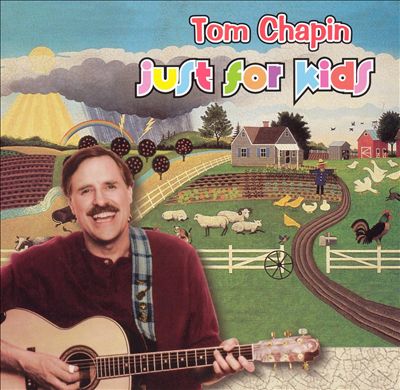 The Mayor serenaded the Village Board with a refrain from a Tom Chapin song celebrating libraries at their Tuesday night meeting when he discussed a proposal to renovate and update the Scarsdale Library.
The Mayor serenaded the Village Board with a refrain from a Tom Chapin song celebrating libraries at their Tuesday night meeting when he discussed a proposal to renovate and update the Scarsdale Library.
He sang,
"Oh, I'm going down to the Library,
Picking out a book, check it in, check it out.
Gonna say Hi to the Dictionary,
Picking out a book, check it in, check it out."
Mark was airing his thoughts about an $18.5 million proposal to reconfigure, modernize and add to the library. The plan includes a redesign of the interior, the addition of an l-shaped seating area and deck surrounding the main room, the addition of several conference rooms, an expanded entrance and lobby with a café and enhanced technology throughout.
Mark said that the Library Board had originally estimated that the project would cost $12 million and expected to raise $7.5 million from private donors. The Village had planned to finance $4.5 million through a bond offering. However, the proposal is now estimated to cost $18.5 million with another $1 million needed to operate a temporary library at Supply Field while the library is under construction.
Mark acknowledged that the current building is aging and has infrastructure issues and lauded the Board for a very thorough plan. He said, "I believe that this project fits well within what residents expect our Village to offer and so would be a great project to do."
But he wondered if "the community is interested in bearing the cost of the debt that would be incurred to fund the Village's portion of the presently estimated total cost" ... and what, if any, would be the "impact of new debt issuances on the AAA credit rating of the Village."
He asked residents to "do their homework" by attending a December 3rd event at the library where the plans will be unveiled or by viewing a model of the proposed renovation at the library after the event. He asked residents to give their feedback to the board at meetings, or by email to let the Board know their views on undertaking this major project. (The full text of the Mayor's remarks appears below)
Later in the meeting the Board accepted a donation of $31,500 from the Friends of the Scarsdale Library to the Scarsdale Public Library Master Plan Capital Improvement Project.
Mark also acknowledged receipt of an extensive report from the Scarsdale Forum's Municipal Service Committee on traffic and safety in Scarsdale. The report includes a traffic assessment and suggestions to improve safety for motorists, cyclists and pedestrians on Village streets. Mark said the Board would fully consider all the recommendations in the report but said there was one that could be implemented now. He asked residents to change their "mindset, expectations and habits" and "slow down, put the smart phones away while driving, bicycling and walking and extend common courtesy to those with whom you happen to be sharing the roads and sidewalks. Applying a large measure of common sense in this regard would go a long way to making all the Village streets – not just those in the Village Center – a safer place for all."
Lawsuit
Village Attorney Wayne Essanason said that a group called Save the Sound has commenced an action against Westchester County and 11 municipalities, including Scarsdale, for failing to comply with a consent decree from the EPA regarding untreated sewage that is being deposited into Long Island Sound. In order to finance the construction of a new sewage treatment plant, Westchester County is pressuring municipalities to enter into an inter-muncipal agreement (IMA) to pay for the work. However, in the interim, Save the Sound filed the suit. Essanason said that the Village is now interviewing counsel to defend Scarsdale and hopes to share the cost with other municipalities.
Construction Noise
The board held a public hearing and passed an amendment to limit construction noise during certain hours. They agreed to outlaw "noise-making construction activity, including but not limited to hammering, ditch digging, scraping, unloading and vehicle backup signaling before the hour of 8 am and after the hour of 9 pm on any weekday and before 10 am and 5 pm on Saturdays, Sundays and legal holidays. During the public comments section Bob Harrison asked the Trustees to consider limiting noise to an earlier hour on weekdays and Mayor Mark said they would consider his suggestion. Village Manager Steve Pappalardo noted that the majority of complaints concerned early morning noise – not evening noise – and that construction crews tended to get to work early and stop at 4 or 5 pm.
Funds for Road Resurfacing
The Village accepted two payments of $30,590 and $64,849 from Con Edison to be used to resurface the following roads that were torn up during the replacement of natural gas lines:
Roads to be repaved are:
- Fox Meadow Road from Wayside Lane to Ogden Road
- Dickel Road and Fairview Roads
Memorial Bench
The Board accepted a gift of $1,000 from Kristen Gorham for a bench plaque at Boniface Circle and a new bench and plaque at Hyatt Field in memory of Gorham's mother Colette Hoey. Hoey lived in Edgewood from 1978 until her death in 2015.
Appointments
The Board made the following appointments:
Vicki Bey of 27 Vanderbilt Road will served on the Advisory Council on Scarsdale Senior Citizens.
Gregory Dietz of 66 Brewster Road will serve on the Conservation Advisory Council
Matthew Schwartz of Montrose Road will serve on the Committee for Historic Preservation to fill the vacancy left by the resignation of CHP Chair Paul Diamond.
Mayor's Comments
Comments by Jon Mark
Meeting of Board of Trustees
November 10, 2015
Scarsdale Forum Traffic Study
Last Friday, the Board received from the Scarsdale Forum the "Report of the Municipal Services Committee on Traffic Assessment, Safety and Improvement in the Village of Scarsdale." The 24-page report dated October 28, 2015 contains numerous detailed observations and suggestions for addressing traffic safety particularly in the Village Center, but also on some of the surrounding streets as well. Traffic safety in the Village is a constant concern and has been for decades. Much has been done over the years to address those concerns, but as the Report points out, there is always the possibility that more can be done – and what is already being done might be done better using updated techniques and technology. The Village staff was already in the process of engaging a traffic consultant to study the sort of issues discussed in the report and we have asked that the comments in the Report be made part of that analysis.
It may take some time to sift through all the Report suggests and to implement those of its suggestions that may be worthwhile. However, one observation set forth in the conclusion of the Report can be implemented now at no cost. To quote the language in the Report: "...to make the Village Center a safer place there needs to be a change in the mindset, expectations, habits and sense of responsibility of motorists, pedestrians and bicyclists who travel to, from and through the Village Center." This sort of change on the part of all of us could do more to promote traffic safety than all the lights and signs we might install. So please, drivers slow down, put the smart phones away while driving, bicycling and walking and extend common courtesy to those with whom you happen to be sharing the roads and sidewalks. Applying a large measure of common sense in this regard would go a long way to making all the Village streets – not just those in the Village Center – a safer place for all.
We thank the Forum's Municipal Services Committee for the hard work that went into researching and preparing their report.
Library Project
"Oh, I'm going down to the Library,
Picking out a book, check it in, check it out.
Gonna say Hi to the Dictionary,
Picking out a book, check it in, check it out."
So sang Tom Chapin in his song celebrating libraries. And that is what I want to talk about next.
The Library Board has presented us with a wonderful plan for renovating and enlarging the Scarsdale Library. In a presentation to a meeting of this Board as a Committee of the Whole held two weeks ago, we were taken through the plan step by step. In general, the plan contemplates substantial reconfiguration of the existing interior; the addition of an "L" shaped reading area around two sides of the existing building; the addition of several conference rooms; the addition of a small outdoor deck; an expansion of the entrance lobby, an upgrading of the Library's computing and communications infrastructure; and the addition of a coffee/refreshment bar. All of this is would be done while making minimal changes to the sides of the existing building that face Olmstead Road and the library parking lot. It was clear that a lot of time, effort and careful thought went into the proposal. It also seemed that there was a general feeling among the members of this Board that the plan was very well done and there was considerable enthusiasm for it among our members.
That's the easy part. The more challenging aspect of the proposal is the estimated cost and funding for the project. As to the former, the present estimate is $18.5 million for the renovation plus another $1 million for the cost of temporary space for library operations during construction – or a total of $19.5 million. As to funding, the concept has been, and still is, to raise funds using a public private partnership approach. In this case, what is meant by that is that the Library Board would attempt to raise $7.5 million from private donors. The Village would commit to issue bonds to cover a portion of the balance of the presently estimated cost— $11 million as proposed by the Library Board -- and an additional estimated $1 million to cover the cost of a temporary Library site, for a total Village commitment of $12 million.
It is noted, that when the Library Board approached the Village Board about the renovation project two years ago the then estimated cost was $12 million. At that time, the Village Board adopted a resolution committing to bond $4.5 million of that estimate provided that at least $4.5 million of private donations could be raised through the efforts of the Library Board members, with the balance of the funds to be raised privately through the efforts of the Library Board. When asked at the meeting two weeks ago to explain the increase in the cost estimate from $12 million to $18.5 million, the members of the Library Board indicated that the earlier estimate had been based on very preliminary drawings. In contrast, the Library Board members stated that the present plan reflects a more comprehensive design.
The question before this Board is then a relatively simple one – although arriving at the right answer may not be so simple. The question, to be blunt, is whether the community is interested in bearing the cost of the debt that would be incurred to fund the Village's portion of the presently estimated total cost. Further, it is probably appropriate to ask, what if the private funding raising efforts fall short and the Village is called upon to fund more than $12 million. Is community interest sufficient to justify any such additional expense?
This Board would like to hear from the community on this subject, but preferably after the community has had a chance to inform itself on the details of what is proposed. It seems apparent from information provided by the Library Board that the Scarsdale Library is a much used, highly valued asset of the Village. Those who ask why that is the case, in this internet age, might not be aware of the community's extensive use of the Library.
The 2014 library strategic plan, available on the Library's web site, reports that:
In 2014, the library had more than 300,000 patron visits with significant growth in circulation and programs, including:
• 352 children's programs attracted more than 13,000,
• Wireless usage was up 40 percent,
• Use of a tutor website increased 148 percent,
• Downloadable e-book usage was up 38 percent,
• Adult programming increased by 30 percent with 152 events, including book groups, films, safe driving classes, medical and public affairs programs.
We were also told that realtors regularly take families contemplating a move to Scarsdale to the Library and show it off as one of the "gems" in the Village.
These figures and experience make a strong case that the Library functions as a vibrant community center—that it is not simply a place to check out books, or for the school population to do their homework at night.
Yet in spite of its continuing appeal, our Library building has aged, it has infrastructure issues that should be addressed, it could be made more user friendly to the disabled and a technology upgrade would be in order if the Library is going to serve the community in the manner 21st century libraries are being used. The sort of changes contemplated by the proposed renovation plan would address these matters and greatly enhance the ability of the Library to serve our community. According to public reports, other communities have made substantial investments in their public libraries with great results. For example, in 2007, Ossining opened a new public library built at a cost of approximately $16 million that was funded with a publicly approved bond issue. Greenwich built a substantial new addition to its library in 1999 at a cost of $16.5 million using funds provided by a private bequest and in 2000 renovated and modernized the original library building using $11.25 million in funds raised from a capital campaign. In March 2009, a $5.6 million renovation of the Byram Shubert Branch Library in Greenwich was completed using mainly private donations supplemented by federal, state and town funds. The Harrison Library completed a $3.6 million renovation in September 2015 with funds provided in roughly equal parts by the Town of Harrison and approximately 500 private donors. In short, it appears community libraries have an important role to play – and serve a real need -- even in our era of digital internet communication.
We have asked the Village staff to analyze the Library Board's numbers in a variety of hypothetical situations. In doing their analysis, the staff has been asked to consider a number of factors, including:
•assumptions about various levels of private and public funding for the library project and amortization rates for Village bond issuances for the project;
•anticipated capital funding which may be needed for other infrastructure projects such as those pertaining to the sewer system, storm water system, the water system and the Scarsdale pool to name but a few;
•anticipated capital funding for the replacement of Village equipment such as fire trucks;
•analysis of the timing of maturities and the decrease of debt service of existing Village debt;
•assumptions of the impact, if any, of new debt issuances on the AAA credit rating of the Village.
We have asked a Village staff working group to meet with representatives of the Library Board to go over these and other aspects of the proposal with a view to reporting back to this Board with the results of their analysis. Once we hear from them, we will update you on next steps.
Scarsdale is a community known for its schools, and more generally the value it places on learning and intellectual accomplishment. Our Library plays an integral role in fostering those important values. It is also an architectural gem that itself now could use some enhancement. The Library Board and its advisors have come up with a wonderful plan that would meet that objective. In short, I believe that this project fits well within what residents expect our Village to offer and so would be a great project to do. Further, projects of this magnitude only come along rarely due to the enormous amount of time and coordinated effort they require from volunteers and professionals. So, one aspect to consider is that if this project is not done, the issues it attempts to address may not be focused on for many years and the opportunity with which we have been presented will be lost – or long deferred. Having said that, this Board is also cognizant of the tax burden we all bear and are desirous of making decisions in a fiscally prudent manner that has meaningful community support. It therefore would be of great interest to get thoughtful feedback from the community as to whether or not there is substantial support for going ahead with what has been proposed and for the community's willingness to have the Village issue the debt to fund it.
So here is your homework assignment. The Library is hosting a party with food, wine and music to celebrate the Library on Thursday, December 3rd at 7:30 pm. The plans for the renovation will be revealed at the party. Tickets are $50. Either attend the party and get a first look at the plans, or take a look at the proposal after December 3rd when it is expected that plans and a three dimensional model of what is proposed will be on display in the Library. Then, let us know what you think. You can comment in person during the public comment portion of our meetings held on the second and fourth Tuesdays of each month or send us an email. Emails sent to clerk@scarsdale.com will be distributed to members of this Board and will become part of the community discussion on this topic.
We look forward to hearing from you on this important proposed community project.







